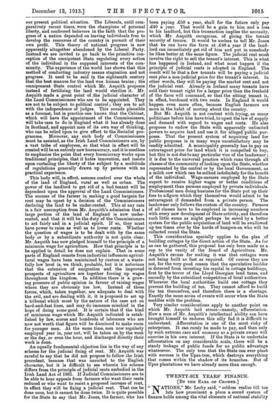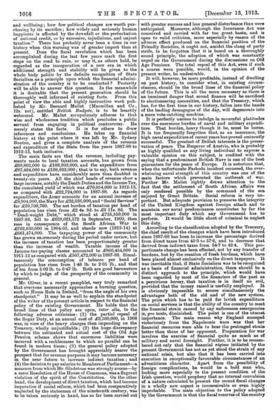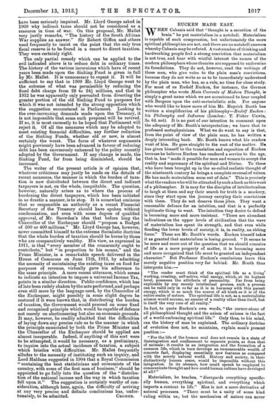TWENTY-SIX YEARS' FINANCE.
[BY THE EARL OF CROMER.]
" NATIONS," Mr. Lecky said, " seldom realize till too .111 late how prominent a place a sound system of finance holds among the vital elements of national stability and wellbeing ; how few political changes are worth pur- chasing by its sacrifice ; how widely and seriously human happiness is affected by the downfall or the perturbation of national credit, or by excessive, injudicious, and unjust taxation." There has probably never been a time in our history when this warning was of greater import than at present. Does the fiscal revolution which has been accomplished during the last few years mark the first steps on the road to ruin, or may it, as others hold, be regarded as the inauguration of a new era in which additional strength and stability will be given to the whole body politic by the definite recognition of State Socialism as a principle upon which the financial admini- stration of the country is to be conducted ? Posterity will be able to answer this question. In the meanwhile it is desirable that the present generation should be thoroughly well informed of existing facts. From this point of view the able and highly instructive work pub- lished by Mr. Bernard Mallet (Macmillan and Co., 12s. net), entitled British Budgets, is to be heartily welcomed. Mr. Mallet scrupulously adheres to that wise and wholesome tradition which precludes a public servant from engaging in political controversy. He merely states the facts. It is for others to draw inferences and conclusions. He takes up financial history at the point where it was left by Mr. Sydney Buxton, and gives a complete analysis of the revenue and expenditure of the State from the years 1887-88 to 1912-13, both inclusive.
The main facts are that the revenue, including pay- ments made to local taxation accounts, has grown from £89,802,000 to £188,802,000, and the expenditure from £87,424,000 to £188,622,000 ; that is to say, both revenue and expenditure have considerably more than doubled in twenty-six years. All the chief heads of revenue show a large increase, notably the Death Duties and the Income Tax, the cumulated yield of which was £70,054,000 in 1912-13, as compared with £22,724,000 in 1887-88. As regards expenditure, the Army accounts for an annual increase of £9,904,000, the Navy for £32,036,000, and "Social Services" for £30,708,760. The net burden of taxation per head of population has risen from £2 4s. 9d. to £3 lls. 8d. The " Dead-weight Debt," which stood at £735,550,000 in 1887-88, fell to £628,021,572 in September, 1900, then rose in consequence of the South African War to £762,630,000 in 1904-05, and stands now (1913-14) at £661,474,000. The taxpaying power of the community has grown enormously during the period under review, but the increase of taxation has been proportionately greater than the increase of wealth. Taxable income of the Income-tax-paying classes amounted to £866,454,000 in 1911-12 as compared with £507,472,000 in 1887-88. Simul- taneously the consumption of tobacco per head of population has risen from 148 lb. to 2-05 lb., and that of tea from 5.02 lb. to 6.47 lb. Both are good barometers by which to judge of the prosperity of the community in general.
Mr. Oliver, in a recent pamphlet, very truly remarked that everyone necessarily approaches a burning question, such as Home Rule in Ireland, "from the angle of his own standpoint." It may be as well to explain the standpoint of the writer of the present article in respect to the financial policy of the existing Government. He holds that the broad lines of that policy are open, inter cilia, to the following adverse criticisms : (1) the partial repeal of the Sugar Duty, at an annual cost of £3,500,000, in 1908 was, in view of the heavy charges then impending on the Treasury, wholly unjustifiable ; (2) the huge discrepancy between the estimated and actual cost of the Old Age Pension scheme shows that enormous liabilities were incurred with a recklessness to which no parallel can be found in modern times; (3) the general policy adopted by the Government has brought appreciably nearer the prospect that for revenue purposes it may become necessary in the near future to increase indirect taxation ; and (4) the decision to pay salaries to Members of Parliament—a measure from which Mr. Gladstone was strongly averse—by a mere Resolution of the House of Commons, was a flagrant violation of the spirit of the Constitution. On the other hand, the development of direct taxation, which had become imperative if social reform, which had been comparatively neglected by the statesmen of the nineteenth century, was to be taken seriously in hand, has so far been carried out with greater success and less general disturbance than were anticipated. Moreover, although the Insurance Act was conceived and carried with far too great haste, and is open to valid criticism, more especially by reason of the adverse effect produced on the financial position of the Friendly Societies, it ought not, amidst the clang of party strife, to be forgotten that it is based on a thoroughly sound principle, the adoption of which was constantly urged on the Government during the discussions on Old Age Pensions. The total repeal of this Act, even if such a course were possible, would, in the opinion of the present writer, be undesirable.
It will, however, be more profitable, instead of dwelling on past history, to consider what, in existing circum- stances, should be the broad lines of the financial policy of the future. This is all the more necessary as there is an imminent danger that sound finance will be sacrificed to electioneering necessities, and that the Treasury, which has, for the first time in our history, fallen into the hands of the leading demagogue of the day, will degenerate into a mere vote-catching machine.
It is perfectly useless to indulge in mournful platitudes over the enormous burden of naval and military expendi- ture. That burden, heavy though it be, must be borne. It is too frequently forgotten that, as an insurance, the high naval expenditure of recent years has proved eminently successful. The greatest of British interests is the preser- vation of peace. The Emperor of Austria, who is probably as highly qualified as any living individual to express a valuable opinion on this subject, is credited with the saying that a predominant British Navy is one of the best guarantees for the peace of Europe. It is notorious that, when the unfortunate Fashoda, incident occurred, the over- whelming naval strength of this country was one of the main factors which prevented the outbreak of war. Further Mr. Mallet rightly draws attention to the fact that the settlement of South African affairs was only rendered possible by the command of the sea. enjoyed by Great Britain. Social reform is very im- portant. But adequate provision to preserve the integrity of the United Kingdom against foreign attack and to maintain our naval predominance constitutes by far the most important duty which any Government has to perform. It would bo little short of criminal to neglect this duty.
According to the classification adopted by the Treasury, the chief result of the changes which have been introduced since 1887-88 has been to increase the percentage derived from direct taxes from 45.3 to 57.6, and to decrease that derived from indirect taxes from 54-7 to 424. This pro- portionate change has been effected, not by any transfer of burdens, but by the creation of fresh burdens, which have been placed almost exclusively on the direct taxpayers. It was inevitable that, if State Socialism was to be recognized as a basis of financial administration, there should be a distinct approach to the principle, which would have been regarded by most of the financiers of the past as a pernicious heresy, that taxation is in itself no evil, provided that the money raised is usefully employed. It is obviously impossible to secure simultaneously the advantages both of the old and of the new system. The price which has to be paid for lavish expenditure on social services is that the ability of the country to meet the financial strain caused by any unforeseen emergencies is, pro tante, diminished. The point is one of the utmost importance. The main reason why England emerged victoriously from the Napoleonic wars was that her financial resources were able to bear the prolonged strain better than those of her opponent. Preparation for war involves the exercise of financial quite as much as of military and naval foresight. Further, it is to be remem- bered not only that the financial regime initiated by the present Government has not as yet stood the strain of any national crisis, but also that it has been carried into execution in exceptionally favourable circumstances of an adventitious character. Apart from the possibility of foreign complications, he would be a bold man who, looking more especially to the present condition of the Irish question, would prophesy that no internal convulsion of a nature calculated to present the recent fiscal changes in a wholly new aspect is inconceivable or even highly improbable. The main objection to the policy adopted by the Government is that the fiscal reserves of the country have been seriously impaired. Mr. Lloyd George asked in 1909 why indirect taxes should not be considered as a resource in time of war. On this proposal, Mr. Mallet very justly remarks, " The history of the South African War supplies an answer." Sir Robert Giffen and others used frequently to insist on the point that the only true fiscal reserve is to be found in a resort to direct taxation. They were certainly right.
The only partial remedy which can be applied to the evil indicated above is to reduce debt in ordinary times. The history of the various incursions which have of recent years been made upon the Sinking Fund is given in full by Mr. Mallet. It is unnecessary to repeat it. It will be sufficient to say that in 1909 Mr. Lloyd George went to the extreme of what was permissible by reducing the fixed debt charge from 28 to 241 millions, and that in 1912 he was apparently only prevented from diverting the greater portion of the old Sinking Fund to purposes for which it was not intended by the strong opposition which the suggestion encountered in Parliament. Looking to the ever-increasing demands made upon the Treasury, it is not impossible that some such proposal will be revived. If so, it is most earnestly to be hoped that Parliament will reject it. Of all the measures which may be adopted to meet existing financial difficulties, any further reduction of the Sinking Funds, whether old or new, is almost certainly the worst. The force of whatever arguments might previously have been advanced in favour of reducing debt has been enormously enhanced by the policy recently adopted by the Government. If any change is made, the Sinking Fund, far from being diminished, should be increased.
The writer of the present article is of opinion that, whatever criticisms may justly be made on the details of recent measures, the manner in which the burden of taxa- tion is now distributed between the direct and indirect taxpayers is not, on the whole, inequitable. The question, however, naturally arises as to where the process of burdening the direct taxpayers, which has been initiated in so drastic a manner, is to stop. It is somewhat ominous that so responsible an authority as a recent Financial Secretary of the Treasury should have spoken without condemnation, and even with some degree of qualified approval, of Mr. Snowden's idea that before long the Chancellor of the Exchequer should " propose a Budget of 300 or 400 millions." Mr. Lloyd George has, however, never committed himself to the extreme Socialistic doctrine that the whole burden of taxation should be borne by those who are comparatively wealthy. His view, as expressed in 1911, is that "every member of the community ought to contribute," but " in proportion to his means," and the Prime Minister, in a remarkable speech delivered in the House of Commons on June 11th, 1913, by admitting the necessity of maintaining the existing taxes on food for purposes of revenue, virtually gave his adherence to the same principle. A. more recent utterance, which seems to indicate an intention to impose a universal Income Tax, points in a similar direction. Public confidence, which has of late been rudely shaken by the acts performed, and perhaps even still more by the language used, by the Chancellor of the Exchequer, might possibly in some slight degree be restored if it were known that, in distributing the burden of taxation, the Government would proceed on some fixed and recognized principle which would be capable of defence not merely on electioneering but also on economic grounds. It may, however, be readily admitted that the difficulties of laying down any precise rule as to the manner in which the principle enunciated by both the Prime Minister and the Chancellor of the Exchequer should be applied are almost insuperable. Indeed, if anything of this sort were to be attempted, it would be necessary, as a preliminary, to inquire into the actual incidence of taxation, a subject which bristles with difficulties. Mr. Mallet frequently alludes to the necessity of instituting such an inquiry, and Lord Haldane suggested in 1904 that a Royal Commission "containing the best statisticians and economists of the country, with some of the first men of business," should be appointed to go fully into the question of the " distribu- tion of the national income and the way in which taxation fell upon it." The suggestion is certainly worthy of con- sideration, although here, again, the difficulty of arriving at any very precise and definite conclusions has, unfor-




























































 Previous page
Previous page